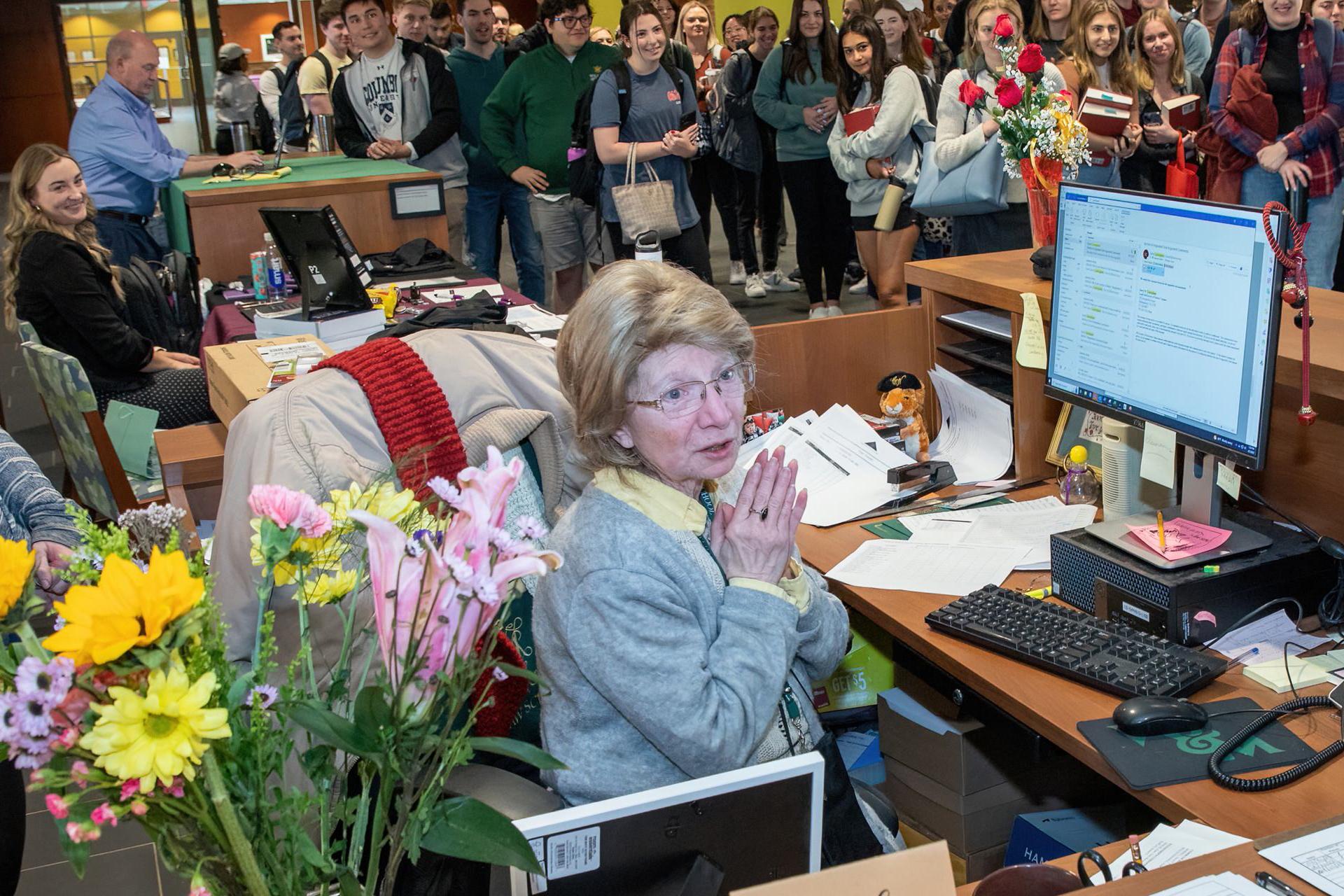
LEADERSHIP - INTEGRITY - SERVICE






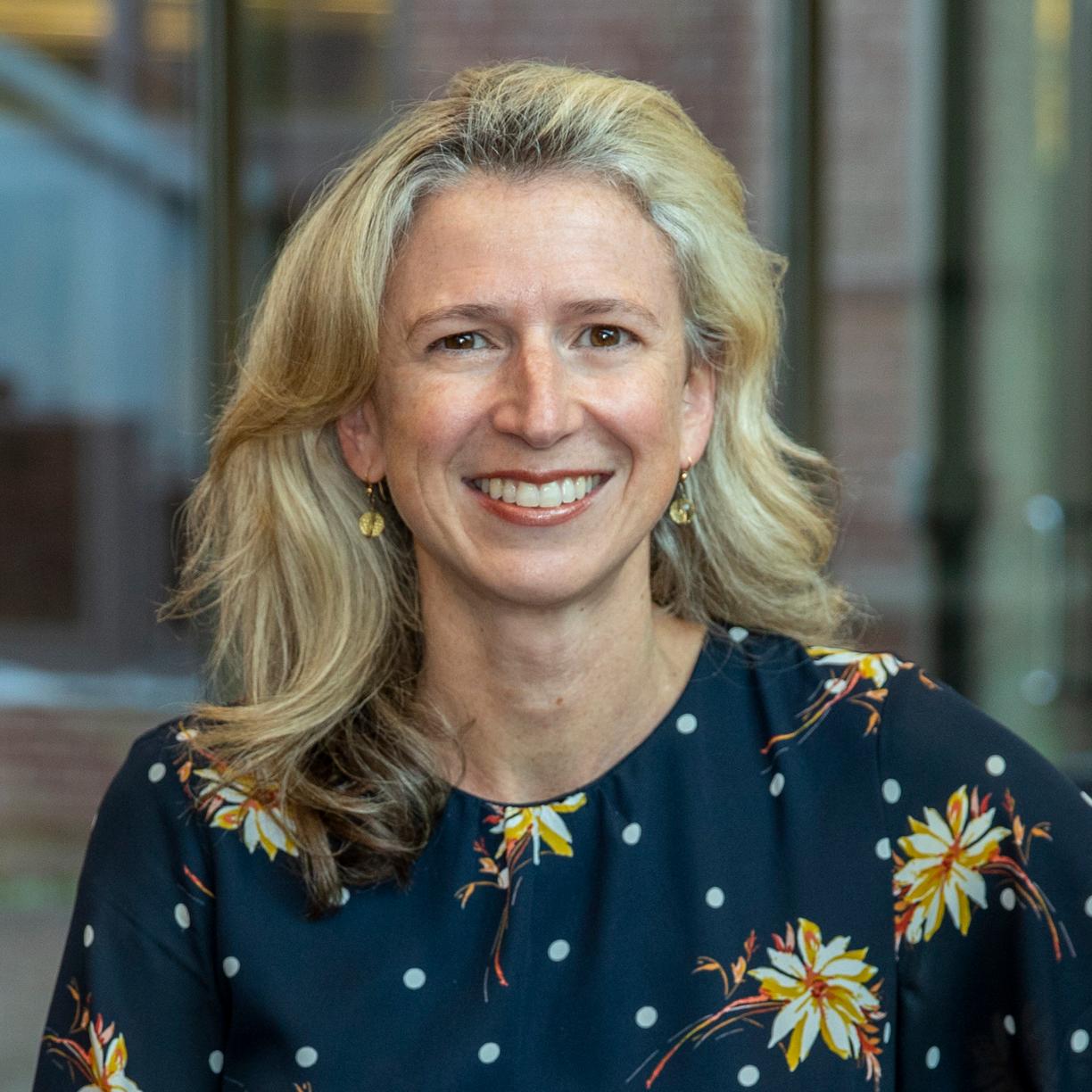 Stacy Kern-Scheerer Director of Clinical Programs
Stacy Kern-Scheerer Director of Clinical Programs
As I sit down to write this brief letter to you all, I cannot help but think “Already?! It feels like I just wrote the one for last Spring!” I am struck by how time truly flies by. However, as I review the pages that follow and read the highlights from the past academic year in the Clinical Program, I understand why it feels like time has sped by: we have been very busy doing good work! We have let no grass grow under our feet as the faculty and students have once again worked tirelessly on behalf of our communities and with the mission of training the next generation of skilled attorneys.
As you will see on the following pages, each Clinic has continued our tradition and commitment to excellence in everything we do. Personally, I am inspired to see how many different experiences our students are having in our Clinical Program. From students in the Appellate Clinic preparing a case in the Fourth Circuit, to Special Education Advocacy Clinic students urging for change before the local School Board, to Immigration Clinic students giving closing arguments in the DOJ Immigration Court, to Low Income Tax Clinic students resolving case after case before the U.S. Tax Court – and those are just a few examples – our William & Mary Law clinic students are out there learning through experiences that will make them exceptional members of the Bar after graduation.
Although each Clinic provides students the chance to learn and explore a distinct area of law, what unites us is so much greater than our differences. No matter which Clinic we are working in, our faculty is steadfast in ensuring our students are getting the best possible experiential education, learning the skills needed that transcend any one practice area. I think you will see for yourself just how much our students are growing and learning through the strong mentorship and training provided by our dedicated faculty, and how much they are providing high caliber pro bono representation in our communities.
Graduation season, and the end of another academic year, always has a special air about it. Sentiments of celebration and gratitude surround us. In that spirit, let us celebrate the past accomplishments of our students as well as cheer for the bright promise they bring for the future. Finally, thank you again to our students, faculty, alumni, and friends, who dedicate their time, energy, and resources to helping us succeed. Without you, our work would not be possible. Thank you.
With warm regards,
 Stacy Kern-Scheerer Director
June 2024
Stacy Kern-Scheerer Director
June 2024
Experiences like these for students are made possible by the Clinic'sgenerous supporters. Your support allows students in all of our Clinics to provide quality legal support to clients on a wide variety of issues and gain invaluable experience on their journey to becoming Citizen Lawyers. You can support our Clinical Program'smission to continue to address the unmet legal needs of our community by clicking here.
The Supreme Court & Appellate Litigation Clinic connects students with practitioners of appellate litigation, providing opportunities for students to learn from and work with the appellate bar. In the fall, the Clinic helped a law firm prepare for oral argument at the Fourth Circuit Court of Appeals. Likewise, in the spring, the Clinic mooted an alum the week before her own trip to the Fourth Circuit. In both instances, students helped the practitioners hone their arguments before facing the judges. “Our proximity to Richmond makes us a natural stop for anyone set to argue before the Fourth Circuit,” said Professor Franklin.
The Clinic also took the lead on a Fourth Circuit appeal, representing a civil rights plaintiff in his appeal from the Eastern District of North Carolina. All the Clinic’s students participatedinthebriefwriting process,whichstartedinthefallsemesterwhentheClinictook thecase.3LBrendanClarkremarked:“Thatbriefwasateam effort.ProfessorFranklinencouragedusasaclasstofigureout thebestargumentstomakeandhowtopresentthem.” The drafts changed substantially from beginning to end, as the Clinic tackled a complex legal issue that has already divided the federal circuits. “WhatstoodouttomewasthewillingnessofProfessorFranklin, asafacultyadvisorandexperiencedappellatelitigator,toentrust studentstotaketheleadonabriefforafederalappellatecourt,” Brendancommentedaftersubmissionofthebrief.
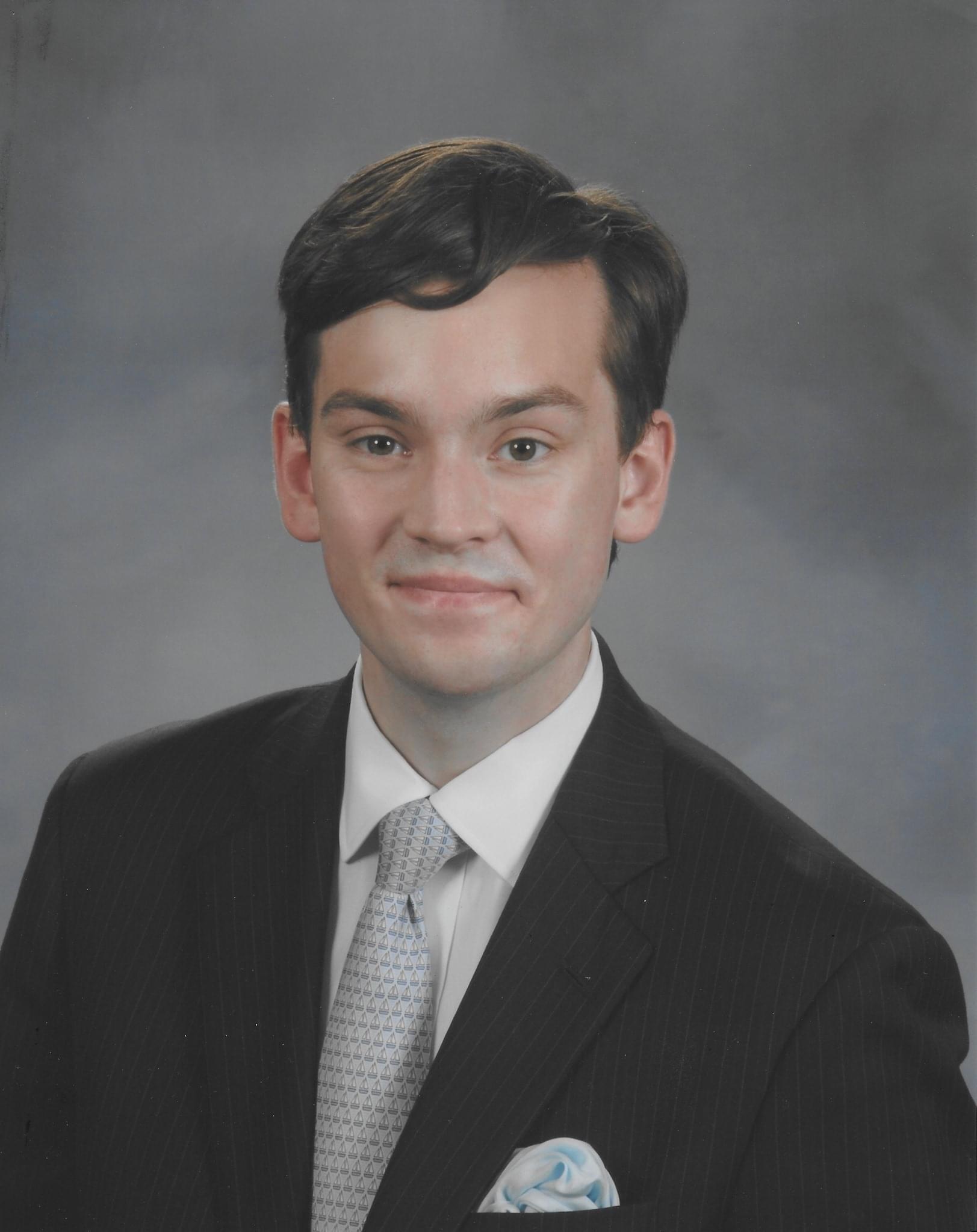
The Clinic’s brief for the appellant received praise from opposing counsel hours after it was filed. The Solicitor General of North Carolina, who represented the opposing party on the appeal, described the Clinic’s brief as “an impressive piece of work” that was “powerful, honest, and well-written.” And even after submission of the appellant’s initial brief, the clock continued running. Because real-world courts do not operate on an academic calendar, a group of students from the Clinic had to work together over winter break to draft and submit the reply brief.

After submission of the briefs, the Clinic prepared for oral argument in Richmond. Asnotedby3LJimDavidson, “preparingfororalargumentrequiredashiftfrom carefullycuratingabrieftounderstandingevery aspect ofthecase.Youneverknowwhatissuesthejudgeswill focusonduringoralargument.” This sentiment carried into the Clinic’s moots, testing every aspect of the issue to strengthen the argument. Remarkingonthisexperience,Jimnotedthat“whatfirstseemedlikeasimple proceduralissuewasreallyasignificantdiscrepancy in thelaw.Ihadtobereadytopresentcomplexarguments aboutjurisdiction,civilprocedure,andaccessto justice.”
Preparation for oral argument also included communications with the client. In the weeks leading up to oral argument, several students went on a road trip with Professor Franklin to meet face-to-face with the client. 3L Mary Hutchingsfoundthisthemostrewardingpart of theClinicexperience.“Themostexcitingand informativethingformewastravellingseveralhours awaytomeetwithourclient,”shesaid.“Assomeone whowantstoworkinpublicdefensesomeday,itwas eye-openingtoseetheeffort counselmustexpendto meetwithanincarceratedclient.”
The Clinic then got a taste of real-world practice after an unexpected development led to a change in prepare, the Clinic shifted its efforts to preparing its Director, argument. This sudden change taught the Clinic about the litigation practice and the importance of flexibility. During one of those


As an added bonus, the Clinic also got to observe an en banc argument on the same day. “Theenbancargumentwasparticularly interestingbecauseofhowmanyquestionstheCourt hadforthe advocate.”3LLaceyFredricksaid.“AsmanyasthreeJudgeswere posingquestionstotheadvocateatthesametime,andwatching theadvocateshandleitcertainlytaughtusabouthowtohandle thesesituationsduringanargument.”
This experience provided the Clinic more than new doctrinal knowledge, however. Multiple members of the Clinic expressed how valuable this opportunity was as a learning experience. “Preparingfor oral argumentwithmyclassmatesandProfessorFranklinhelped mereachbeyondmyexperienceonMootCourt andunderstand thateffectiveoraladvocacy ismorethanjustmemorizinga presentationandanswerstoquestions,”JimDavidsonsaid.

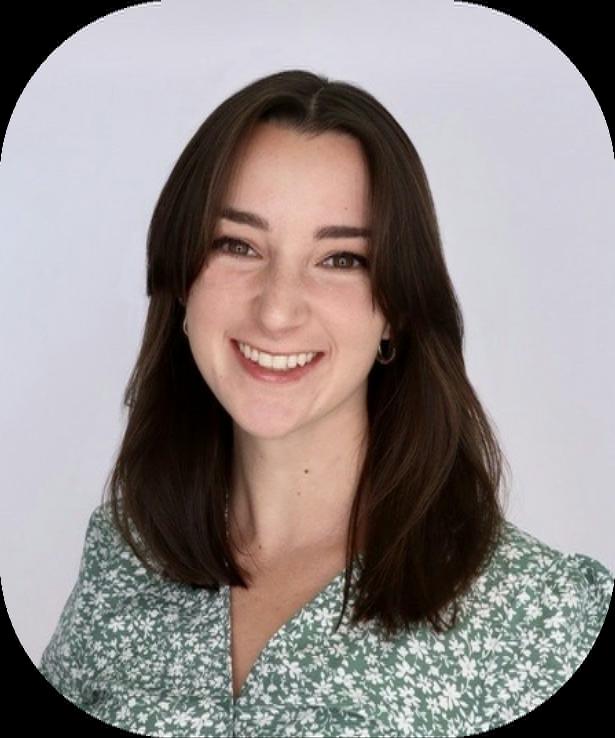

3LRobbyDrakeaddedtothissentiment.“Priortoworkinginthe Clinic,IhadobservedMootCourtsduringmyinternships. However,thiscaseaddedauniqueperspectivetomyexperience byfullyimmersingmeintothecaseandgivingmetheopportunity todirectlyengagewiththisissue.”
The Clinic was supported throughout this process by alum Robbie Jones, who reviewed drafts of the briefs, spoke to the clinic, and helped with the Moot Courts. Professor Franklin is exploring ways to increase this collaboration with Jones and the firm at which he works, Sullivan & Cromwell LLP, and to offer more opportunities for alums and other attorneys to receive assistance in preparing for appellate arguments.

WhyisDomesticViolenceanimportantareaoflawfor studentstogainexperiencewiththroughthisClinic?
DVis important for students to learn about because DVimpacts everyone and crosses multiple areas of law. Approximately one in three women experience gender based violence in their lifetime. We all know someone who has been a victim of violence. This means that DVis not just a Criminal Law issue. DV involves Family Law, Employment, Health Care, Housing, Immigration, Military Law, and many others. Participating in the DVClinic exposes students to the law surrounding intimate partner violence, but more importantly to the real people whose lives are affected by DV. It is easy to make statements about how to address DV, but when faced with a victim who is scared of deportation, has no where to live, and may lose custody of her children we internalize the truth that there are no easy answers.
HowdidyoubecomeaDomesticViolenceprosecutor?
Most of my career has been based on helping vulnerable groups of people. I never set out to be a DV prosecutor. In March 1995, the end of my 3L year at UVALaw, I was set to go into International Law. However, I met my husband in UVA’s Libel Show, and everything changed. I stayed in VAand needed a job. The first one I got was as an Assistant Commonwealth’s Attorney in Hampton. I quickly moved to working on child abuse and elder abuse cases. The cases were heartbreaking, but important work. I eventually left Hampton and had several other jobs, including as a Public Defender. I was working as a GAL for children when the DVposition in York County opened. A friend convinced me to apply and the rest is history.
WhatmadeyouinterestedinjoiningtheClinicalProgramasaprofessor?
I was lucky to know Darryl Cunningham, who was the long time Managing Attorney for the DVClinic. I regularly lectured to his classes about my role in DVcases. I have the privilege of following in Darryl’s footsteps. My true hope for the DVClinic is that no matter what jobs the students take or where they go, the Clinic will inspire them to believe and support DVvictims. Maybe they will volunteer at a DVShelter or perform pro bono work for a DVvictim. Maybe it will be as simple as being willing to speak up when friends, family or co-workers are criticizing a DVvictim for a delayed report or for returning to her abuser and explaining why that happens and why that doesn’t mean the abuse didn’t happen.
Working with Clinic students is amazing. I am so impressed by how bright everyone is. Teaching 3L students gives me the opportunity to re-examine my own practices, thoughts, and beliefs. The DVClinic will keep me from getting complacent in my own practice. WhathaveyouenjoyedaboutworkingwithClinicstudents?
In future semesters, I am looking forward to getting all my students in court on several types of hearings. I hope to eventually partner with civil attorneys to expand the types of court involvement Clinic students can experience. Most of all, I hope to engage students in difficult conversations and experiences in a safe and supportive way so they gain new insights into the humanity of the practice of law. WhatareyoulookingforwardtoaboutfuturesemesterswiththeClinic?
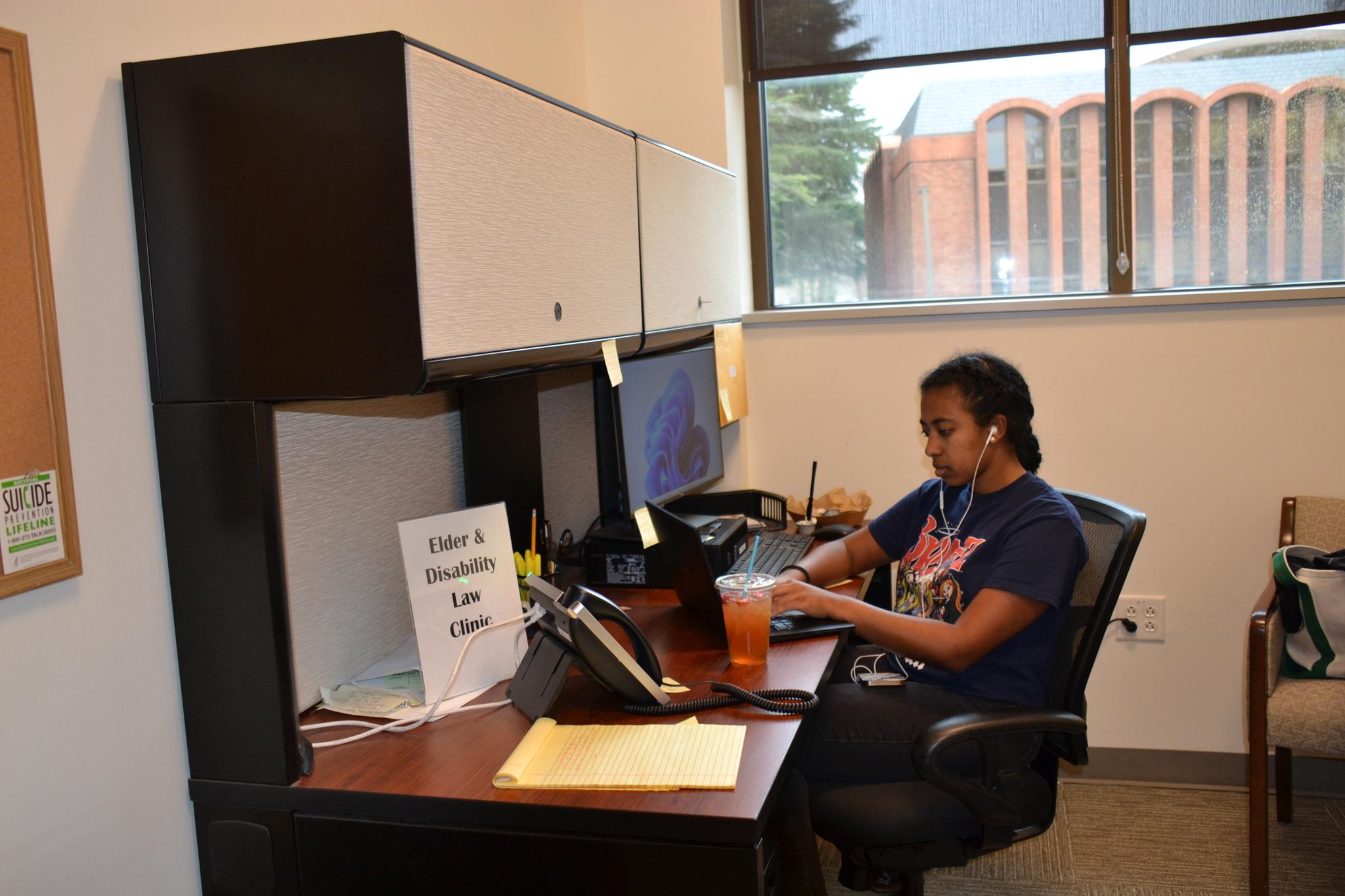
As technology continues to develop and evolve, one of the largest and fastest-growing advancements is artificial intelligence (AI).[1] ** While AI’s use has had a multitude of successes within our society from broadening the automobile and transportation industry[2] to reinforcing and enhancing cybersecurity measures[3] one field that has been overshadowed, which could significantly benefit from the implementation of AI, is the realm of elder and disability law. While elder and disability law encompasses a vast number of topics and focuses, including guardianship and conservatorship, Medicaid and Medicare, estate planning, wills and trusts, and more, the intersection of this transformative technology and this domain presents promising opportunities and critical considerations for legal practitioners, policymakers, and advocates.
While not exclusive to the realm of elder and disability law, the innovation of systems such as ChatGPT, humanoid robots[4], and the metaverse, AI has been used to increase accessibility for individuals with disability and elders through programs such as advanced speech recognition systems to real-time captioning to improving communication access for those with hearing impairments. Especially for individuals living alone or with scheduled caretakers, AI has advanced smart home devices to assist with daily tasks, monitor safety, and facilitate independent living. Additionally, the use of AI can be implemented to set reminders for medication management and fall detection motion sensors. These developments have been instrumental in fostering equity and autonomy for impacted individuals.
Furthermore, in expanding the ability to access legal assistance, the use of AI shows promise as navigating the elder and disability system may become more cost-effective as AI may streamline the process and reduce manual labor.[5] Moreover, virtual assistants and chatbots can provide individuals with disability and the elderly with personalized legal guidance and support. Not only may AI be used to assist in accessing legal assistance, but may also be beneficial in guiding individuals in understanding systems such as Medicare and Medicaid.[6] AI tools have demonstrated the potential to be used for eligibility screenings as well as simplifying the complexities of the system so that individuals may maximize their access to benefits and services by identifying available programs, aiding in the application process, and calculating financial eligibility.
In terms of guardianship and conservatorship, AI may be used to assess, monitor, and report an individual’s medical decision-making capacity.[7] “AI tools can be used as screeners to minimize [the] risk of biases including against those of traditionally marginalized groups or people with different values than the assessing physician.”[8] This may provide a more objective analysis of an individual’s cognitive abilities and their functional limitations. Moreover, it may be used to monitor the improvements of individuals if they progress and signal for arrangements to accommodate these changes. Moreover, with AI having the ability to continuously monitor an individual’s capacity and their associated guardianship and conservatorship, AI has the capability of alerting for signs of abuse, exploitation, and neglect.
In summary, the use of AI and AI tools can contribute greatly to the field of elder and disability law. While this does not encompass the full realm of possibilities that AI may be able to accomplish, it demonstrates a promising future for making the systems involved more inclusive, accessible, and manageable. With these great advancements, however, it is important to note the possible legal and ethical implications that may arise through this integration. Nevertheless, proactively addressing any concerns and challenges as they come can continue to enable the progression of success within the elder and disability law field.
**This article first
In early April, the Immigration Clinic secured two asylum victories in one single day for our Afghan allies. These cases spanned two academic years, but both cases were granted by the Arlington Asylum Office on the same day.
In August of 2021, thousands of people went to Hamid Karzai International Airport in Kabul, Afghanistan to flee the Taliban. Among those thousands of people were Ms. S*, daughter of an Afghan government official, and Mr. K*, an Afghan attorney, and his wife Mrs. K*. Luckily, they all managed to get on a plane out of Kabul and were evacuated to the United States. When they were resettled to Hampton Roads, Ms. S, Mr. K, and Mrs. K all reached out to the Immigration Clinic for assistance in their cases.
During the 2022-23 Academic Year, Melissa Box J.D. ’23 worked with Mr. and Ms. K on their asylum cases. Then during the 2023-24 Academic Year, Sarah Nagle, J.D. ’24 worked with Ms. S on her asylum case.
Below, we share the stories behind these lifechanging victories.
In Fall 2022, Melissa Box, J.D. ’23, was assigned to work on Mr. and Mrs. K’s asylum case.
Melissa was first assigned to write Mr. K’s affidavit for his asylum case. Asylum affidavits require several interviews and meticulous detail about a client’s case. While an asylum applicant’s testimony can, in theory, be enough to prove their case, the written and oral testimony must be consistent and credible. In order to capture the level of detail necessary for his case, as well as accurately prepare an affidavit in his voice, Melissa worked with Clinic Director Professor Stacy Kern-Scheerer to interview Mr. K. Across many interviews over the course of many months, Melissa learned about Mr. K’s career as an attorney, his passion for his work, and the danger he faced because of it.
Through their interviews, Mr. K and Melissa built a deep and lasting rapport. “I was lucky to have the time to make sure I fully understood Mr. K’s life’s story and gain his trust,” Melissa shared before her graduation last year. “I know Mr. K better than some law students I’ve spent years in class with. I know his mannerisms and was able to advocate for him. It really meant a lot when my client told Professor Kern-Scheerer and me that he thought I knew him better than he knew himself.”
After writing Mr. K’s affidavit, Melissa researched conditions in Afghanistan relevant to Mr. K’s case, including the treatment of attorneys and former government employees in Afghanistan. Melissa worked
with Clinic Professor Nicole Medved on finding and preparing the country conditions evidence that would best support Mr. K’ asylum claim. This research was critical to contextualizing Mr. K’s fear of returning to Afghanistan.
After the Clinic submitted Mr. K’s asylum case in March 2023, USCIS quickly scheduled Mr. K and his wife for an asylum interview in April 2023, during the last week of classes of the semester. Clinic Director Professor Kern-Scheerer and Melissa prepared Mr. and Mrs. K for what to expect at the interview, and Melissa prepared her closing argument to present to the Asylum Officer for why Mr. and Mrs. K merit a grant of asylum.
During the last week of class, Professor Kern-Scheerer and Melissa accompanied Mr. and Mrs. K to their asylum interview. After a roughly 3-hour hour interview, Melissa delivered her closing argument to the officer. After the interview had finished, there was nothing left to do but wait for a decision on the case.

Ms. S and her family also reached out to the Immigration Clinic for assistance in their asylum case. Ordinarily, children can be included on their parents’ asylum applications so that if the parent wins asylum, the child wins as well. However, Ms. S was too old to be included in her father’s case. Instead, she would have to meet the high burden of asylum all on her own.
This fall, Sarah Nagle, J.D. Class of 2024, was assigned to work on Ms. S’s asylum case. Sarah’s first task was to write Ms. S’s affidavit. Asylum affidavits are a critical piece of evidence because an asylum applicant’s testimony alone can be sufficient to prove their case. Since interviews with Ms. S about her story had already been completed, Sarah worked with Professor Kern-Scheerer to best capture Ms. S’s voice in her affidavit. “Sarah faced a unique challenge in writing Ms. S’s affidavit,” said Professor Kern-Scheerer. “Her assignment was to capture Ms. S’s personality and convey her fears without having heard her tell the story herself. This also underscored the importance of prior students having kept meticulous notes from previous interviews and discussions. Sarah met this challenge with thoughtful persistence, and wrote an excellent affidavit for Ms. S. ”
“Working on an affidavit was unlike any legal writing I had ever done before,” said Sarah. “Focusing on what was important to Ms. S—family, peace, and a willingness to stand by her convictions—helped anchor me in her perspective. Even though every word of the affidavit was based on her own words, I had doubts about my success until I reviewed the affidavit with her and received a smile, firm nod, and assertive ‘yes’ that I had captured what she wanted to convey. Being entrusted with helping tell someone else’s story was a great honor and fantastic learning experience.
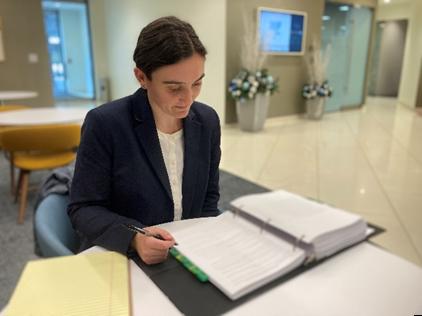
After completing Ms. S’s affidavit, Sarah next turned to researching conditions in Afghanistan relevant to Ms. S’s case. While it is easier to find evidence about the Taliban’s brutality against former government officials or former members of the military, finding evidence of the Taliban’s violence against their family members is not as simple. Sarah worked with Clinic Professor Nicole Medved next on finding and preparing the country conditions evidence that would best support Ms. S’s claims. This evidence played a critical role in contextualizing Ms. S’s fears of returning to Afghanistan.
In November 2023, after finishing all of the forms, affidavit, and evidence gathering, the Clinic submitted Ms. S’s asylum application to USCIS.
Toeveryone’s surprise, Ms. S was scheduled for an asylum interview just three weeks later. Sarah and Professor Medved worked closely with Ms. S to prepare her for what to expect at the asylum interview. Sarah also prepared her closing argument for Ms. S, demonstrating how Ms. S’s affidavit and country conditions evidence all prove that Ms. S merits a grant of asylum.
In December, Professor Medved and Sarah Nagle accompanied Ms. S to her asylum interview in Arlington, Virginia. After Ms. S’s two-hour interview, Sarah delivered her closing argument to the officer.
“Actually getting to speak during a legal proceeding, instead of just observing, was incredible,” said Sarah. “It was really empowering to be trusted with such an important moment in someone’s life, and also reassuring to have Professor Medved right there in the interview with me after having helped me prepare and rehearse the statement!”
After Sarah’s closing argument, all that was left to do was wait. Despite requirements from Congress that her case should be decided quickly, the Clinic’s experience showed that Ms. S would likely wait many more months—or even years—before hearing a decision on her case.
However, in April, the Clinic received notice that Ms. S’s asylum case was approved. Ms. S’s case marks the fastest decision ever received on any asylum case the Clinic has submitted.
Then, just hours later, the Clinic received notice that Mr. K’s asylum case was also approved, nearly one year after his asylum interview. With Mr. K’s case approved, his wife Mrs. K was also automatically granted asylum.
Now that their asylum cases have been granted, Ms. S, Mr. K, and Mrs. K can all live in the United States without fear of being forced to return to Afghanistan. They will be eligible to receive lawful permanent residency (their “green cards”) in one year, and eligible to apply for citizenship five years after that.
“My experience at the William and Mary Immigration Clinic was so meaningful,” said Melissa. “I know that I actually had a positive impact on my clients’ lives. It makes me smile when I think of Mr. K calling me his ‘Big Little Sister’ (because I’m taller than him but younger than him). I know my time and work was valued by Mr. and Ms. K.”
“Hearing that my client’s asylum case had been approved was the most incredible, and surreal, experience,” said Sarah. “Because students work in the Clinic for at most two semesters and USCIS usually operates on a timeline far longer than that, I’d gotten very used to the idea that I wouldn’t see the results of my work during my time in the Clinic. But because of the unusually quick turnaround for this asylum case, I got to share the news with Ms. S in an email that contained a lot more enthusiasm than is usually warranted in a legal context. It was a wonderful way to close out my time with this client.”
“We could not be happier for Mr. K, Mrs. K, and Ms. S or prouder of the Clinic students who worked tirelessly to prepare their asylum cases,” said Professor Kern-Scheerer. “Sarah’s and Melissa’s work, and the strong relationships that they built with the clients through their time in the Clinic, is emblematic of the incredible work that our Clinic students do here every day. In this busy season as we wrap up the end of this academic year, we’re grateful for the opportunity to pause and celebrate these lifechanging outcomes.”
Victories like these are made possible by the Clinic’s generous supporters. You can make wins like this a reality for more immigrants in Hampton Roads by donating to the Immigration Clinic.
*All client names and initials have been changed for confidentiality and security

Thereisnosubstituteforexperience,andI’vehadmanyunique experienceswhileworkingwiththeInnocenceProjectClinic. I’ve learned how claims of actual innocence are litigated and decided. I’ve learned about the kinds of evidence which can lead to wrongful convictions – poor eyewitness identifications, false confessions, government misconduct, untested DNA evidence, and more. But most importantly, I’ve learned why innocence statutes and the Innocence Project Clinic are so necessary: tragic wrongful convictions are all too common.
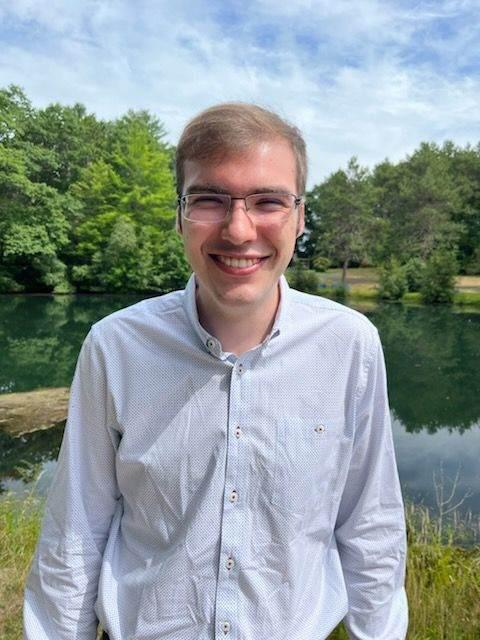
In the Innocence Project Clinic, I’ve learned about a person who spent decades behind bars for another’s crimes, a mistake which allowed the true perpetrator to hurt over a dozen more victims. I’ve learned about a pre-innocence statute, post-conviction case where the government convicted a person of murder based on perjured testimony and other exculpatory evidence the government knew or should have known about but did not provide to defense counsel. I’ve learned about a person who police wrongfully arrested for murder. But I’ve also learned that advocates can correct these wrongs through zealous advocacy and diligent investigation. The Mid-Atlantic Innocence Project, which our clinic works with, helped that person prove through DNA and other evidence. Fred Gerson, the Innocence Project Clinic’s director, helped the person convicted in-part because of perjured testimony prove their innocence in habeas proceedings, even as procedural issues barred introduction of a preliminary medical report concluding that the death in that case was a suicide, not a murder. The person who was wrongfully arrested for murder was exonerated through an attorney’s diligent investigation which led to the discovery of cell tower data and Curb Your Enthusiasm episode outtakes (yes, really) placing that person at a Dodgers game when the murder occurred. While two of these examples are not tied to Virginia’s innocence statute, they demonstrate the cracks innocent defendants may fall through in the criminal justice system. Those cases show why innocence advocacy is so necessary – not everyone gets to tell their story as well as those people were able to.
Themostexcitingpart ofassistingtheInnocenceProjectisofcoursebeingapart ofthatinnocence advocacy myself. In the Innocence Project Clinic, I’ve analyzed everything from phone records to police reports while evaluating a real claim of actual innocence. I’ve also learned that almost every step of innocence litigation is more complex than one might think. For instance, arranging a prison video call with my client took weeks of troubleshooting, emails, and scheduling. I had to make a phone call and browse a state employee registry to track down my client’s prison counselor. It took three unsuccessful video calls to resolve technical difficulties. But in the end, I spoke with my client, which allowed them to tell me their side of the story. Giving my client this opportunity was an immensely rewarding experience.
I’ve also developed practical skills like learning how to file Freedom of Information Act (FOIA) requests. FOIA requests allow the Innocence Project Clinic to review government agency information, often in the form of documents, photos, videos, and recordings. Using FOIA requests, the Clinic can better understand investigations and prosecutions which led to convictions, which helps the Clinic evaluate claims of actual innocence. I’ve learned by filing multiple FOIA requests that every government body has a preferred method of receiving and responding to FOIA requests. For instance, the police department I worked with used a specialized FOIA website, while a Commonwealth’s Attorney’s Office used email. Even the way one receives requested documents can differ; the police department provided me with a combined PDF of the documents I requested, while I had to drive to the Commonwealth’s Attorney’s Office to review information in person. Further, have I learned sometimes the same document received from different government agencies will have different redactions, allowing me to piece together a more complete document. Through clinic work like this, I have obtained valuable skills which will help me be a better lawyer.
Overall, my time assisting the Innocence Project Clinic has been eye-opening and fulfilling. The skills I have developed and experiences I have had have informed my time in law school and will surely inform my legal career. My advice to those on the fence about trying a clinic is to give it a go! You have nothing to lose and so, so much to gain. Thereisnosubstituteforexperience,andtheInnocenceProjectClinicisawonderfulplacetohave importantexperiencesthatyouwillneverforget.
The Law School’s Low Income Tax Clinic successfully resolved six U.S. Tax Court cases during the Spring 2024 semester. These taxpayer client representations provide our clinic students with great experience in how to build a case from the ground up. They had to analyze the internal revenue code and relevant treasury regulations, interview witnesses, including IRS personnel, participate in administrative hearings before the IRS Office of Independent Appeals, and lastly participate in the U.S. Tax Court proceedings. All these tasks are great and relevant experiences for our tax clinic students. Ourclientsenjoyedthebenefitsof taxsavingsandrefundsthatapproaches$302,000intotal. Awonderfulandgratifyingresultforthe semester’seffortsbyourstudents.
In one case the Internal Revenue Service (“IRS”) failed to give our client credit for income taxes withheld from his pay checks by his employer and remitted to the IRS. The IRS also refused to permit our client from claiming his granddaughter as a dependent despite having court ordered physical and legal custody of this granddaughter. Ourtax clinicstudentsprovedupalltherequired elementsthatledtotheIRSconceding theircaseandissuingourclientatax refundof$6,100.
In another case, the IRS assessed taxes and penalties against our client of approximately $266,000. Most of the alleged tax assessment relates to the IRS taxing our clients on the entire proceeds they received on the sale of their primary residence. The students analyzed the law and developed the facts so they were able to establish that all of the $690,000 sales proceeds should be excluded from income taxation. Theresult reducedourclient’staxdeficiency from $266,000to$11,450;areductionintheir taxliabilityofabout$255,000. Ourclients wereecstaticwiththisresult!
Two other cases involved incidences of identity theft whereby several bad actors somehow acquired the addresses and social security numbers of two unrelated clients. In each case, the unscrupulous persons received wage income, Virginia lottery winnings, Maryland unemployment benefits and Uber income using the stolen identities to report the income. In each case, our students proved that our clients were not the individuals who purportedly earned this income. The IRS conceded their positions in both cases, leading to no tax liability results for each client on the erroneous income. Totaltaxdeficiencies removedbytheTaxCourt forthesetwo clientsexceeded$15,900.
The fifth case resolved involved another case where the IRS denied our client a dependency deduction for claiming his minor in age sister, for which he provided all her support and living accommodations. The IRS also denied the child tax credit, childcare credit, earned income tax credit, and head of household filing status to our client. The IRS also refused to provide our client with credit for tax payments on tax withholdings made by his employers. Thestudentsprovedupall theelementsrequiredtoachieveatax refundtoourclientofover$9,000. The IRS deficiency was set aside in its entirety, and the frozen tax credits were released and paid to our client.
The sixth case involved a client who was a barber. He reported income of approximately $20,000. He also provided 100 percent of the financial support for his three daughters who resided with him. The IRS denied our client of three dependency exemptions, head of household filing status, the earned income tax credit, the child tax credit, the childcare credit, and refused to accept reported income on his Schedule C from his haircutting services. Two of our tax clinic students developed the relevant facts based on a series of interviews, prepared affidavits to provide sworn statements for much of the facts relating to our client’s three children. On the barber haircutting services, through the evaluation of client’s bank statements, cash app payments, and testimony relating to cash payments received by our client, the IRS accepted the income and expenses as originally reported on his 2022 income tax return. TheTaxCourt agreedandenteredanorderprovidingour clientwiththefrozentaxcreditsthat amountedtoapaymentbytheIRStoour clientofover$11,300.
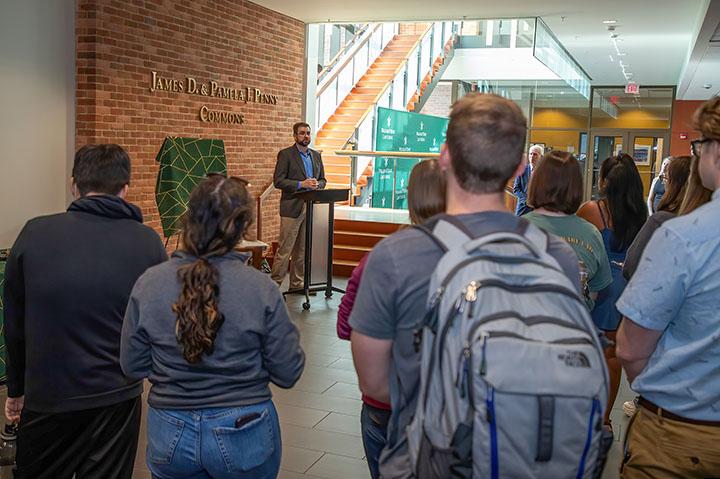
On Tuesday, April 23, William & Mary Law School’s Lewis B. Puller, Jr. Veterans Benefits Clinic held a reception dedicating a plaque in remembrance of the Clinic’s first client. Chief Petty Officer Gene M. Todd Jr., USN (Ret.). Todd passed away in October of 2023 and was the husband of Gloria Todd, the Law School’s former Office Manager, who retired in 2019.
Tohelp describe Gene Todd’s involvement with the Clinic, Professor Caleb Stone shared remarks from Stacey-Rae Simcox, a founder of the Puller Clinic.
"When the Puller Clinic started in 2008, no one in the building had ever practiced veterans law before, and there weren't many veterans law practitioners in the nation," Simcox said. “It was a fledgling area of the law, and we needed the right client to practice on. Miss Gloria immediately decided that Gene Todd was the perfect fit—whether he agreed or not.”
Simcox said that as a client, Gene Todd wasn’t afraid to ask questions and voice his opinions.
“He referred to himself as our ‘guinea pig,’ and he sure earned it,” Simcox said. “After a time, Mr. Gene began to believe that the work we were doing could make a difference, not just in his life, but in the lives of other veterans.”
Simcox recounted that Todd also saw the students benefit and became the Clinic’s biggest supporter. She noted how he was there for every event, every open house, every tiny presentation; he texted jokes, he emailed support; he called just to say “hi” to all the students and staff.
“It’s hard to explain the impact Mr. Gene’s trust in and support of the Puller Clinic has had,” Simcox said. “It would not be an overstatement to say that thousands of people have been helped in so many ways. Every good result associated with the Puller Clinic started with that one handshake, where Mr. Gene trusted us, and we promised to listen to him and do our best.”
On hand as guest of honor, Todd’s wife, Gloria, said that everybody in the Clinic helped him and got him his disability compensation, which changed his outlook because somebody actually cared to help him.
“He tried to get these disability benefits for a long time, and he was just about to give up,” Todd said. “I want to thank you guys very, very much, and for helping these past veterans and those that you will be helping in the future.”
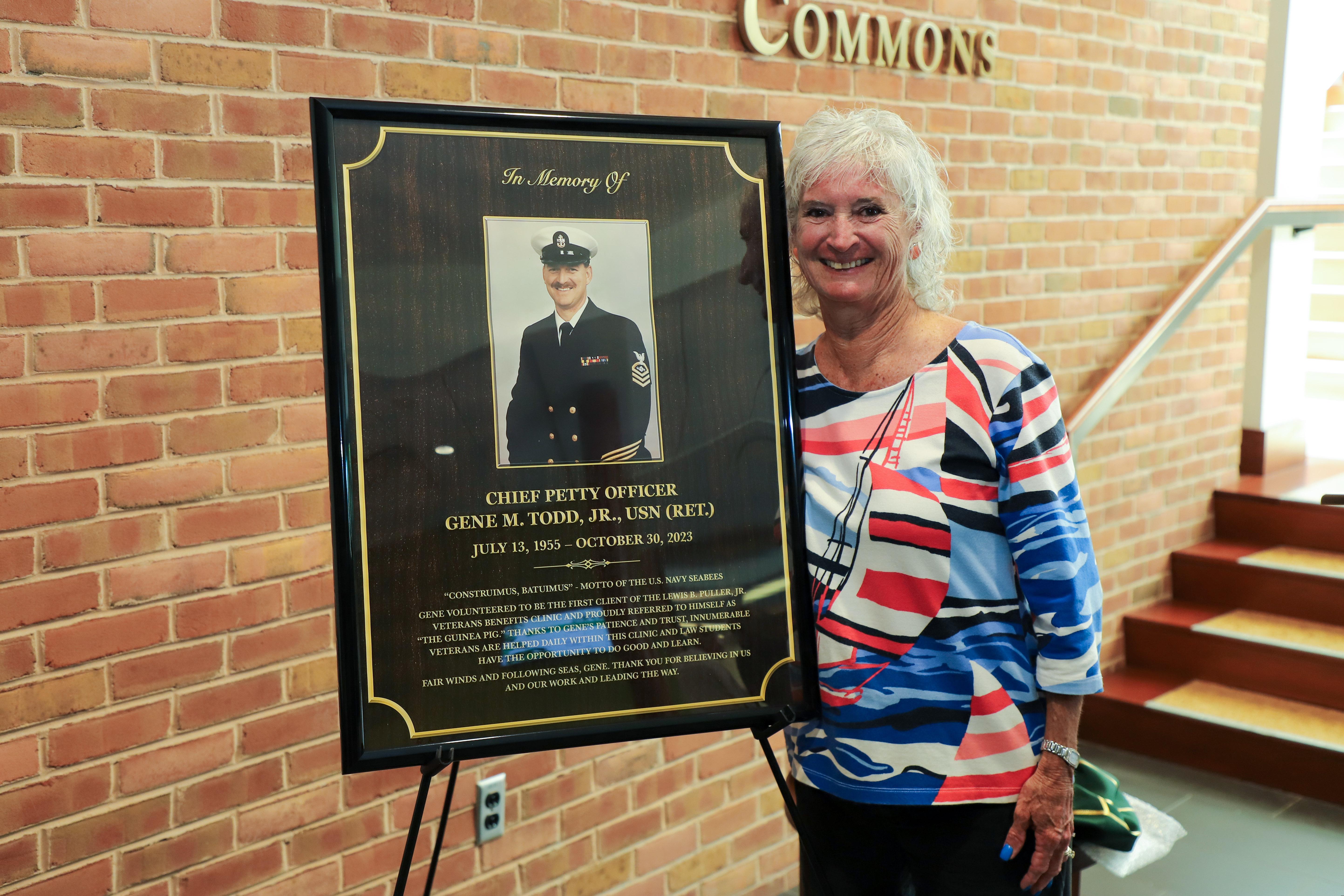
TheLewisB.Puller,Jr.VeteransBenefitsClinicatWilliam& Mary LawSchool,withsupport fromStarbucks,hasassisted morethan500veteransseekinghelpwiththeirVAdisability claimsthroughits“Military Mondays”initiative.

The Puller Veterans Benefits Clinic at William & Mary Law School recently assisted its 500th veteran through its “Military Mondays” program. Established in June 2015, the program was piloted in coordination with Starbuck’s Armed Forces Network and launched in the Hampton Roads area of Virginia – home to more than half-a-dozen active military bases, upwards of 100,000 active-duty and reserve personnel and thousands of veterans. “Military Mondays” is intended to help address the challenges veterans face in the disability claims process and provides a place for veterans, service members, and their families to find community, conversation, and information. The program is free to participants.
In many ways, Military Mondays operates like a stream-lined assessment and screening organization: when a veteran submits an application to the Puller Clinic for services, Clinic staff review the application to determine which questions can be answered in an hour at Starbucks, and which might require deeper analysis. Sometimes, the law students and staff are able to assist the veteran during their appointment at Starbucks; at other times, they provide guidance so the veteran can complete the process on his/her own. If an hour isn’t long enough to cover the veteran’s issues or more research is needed, the veteran may be referred to the larger Clinic, where more research and information-gathering can take place. Depending on the nature of the claims, the complexity of the case, and the type of evidence that may be required, the Clinic may take on the veteran as a client.
In January 2016, the Clinic and Starbucks Armed Forces Network were honored with the American Bar Association’s (ABA) 2016 Brown Select Award for this innovative program. The criteria for the award included innovation in the provision of legal services to those with unmet legal needs of the middle class and those of moderate incomes, and the potential for replication of the program.
The Puller Clinic handles hundreds of veterans benefits cases each year. Under the supervision of clinic attorneys, dozens of law students get intensive hands-on training each year in complex claims requiring extensive legal and factual research. Law students often accrue more than 100 hours a semester doing disability claims casework for veterans.
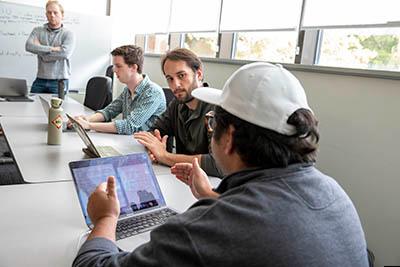
The students in the Fall 2023 semester of the Special Education Advocacy Clinic took on cases involving several students who had been physically restrained while in school, and all of these cases were occurring in the Williamsburg-James City County Schools. This was odd, because back in 2015, the Virginia General Assembly required that public schools limit restraint and seclusion primarily to situations involving imminent threats of serious physical harm (the sole exceptions relate to weapons and substances).
The Clinic soon discovered that even though the Virginia Department of Education adopted regulations subjecting local school districts to the limitations required by the legislature, many school systems in Virginia intentionally adopted non-compliant variations of the state regulations that open the door to almost unlimited use of restraints. The Clinic’s students deployed a variety of tactics to address the problem, including FOIA requests, communication with the state special education advisory committee, and reaching out to various state and local decision-makers. At the local level, three third-year law students – Emily Baker, Rebecca Fox, and Kaitlyn Frerking – went to the WJCC School they realized they
At its April that restraints alone does not school students
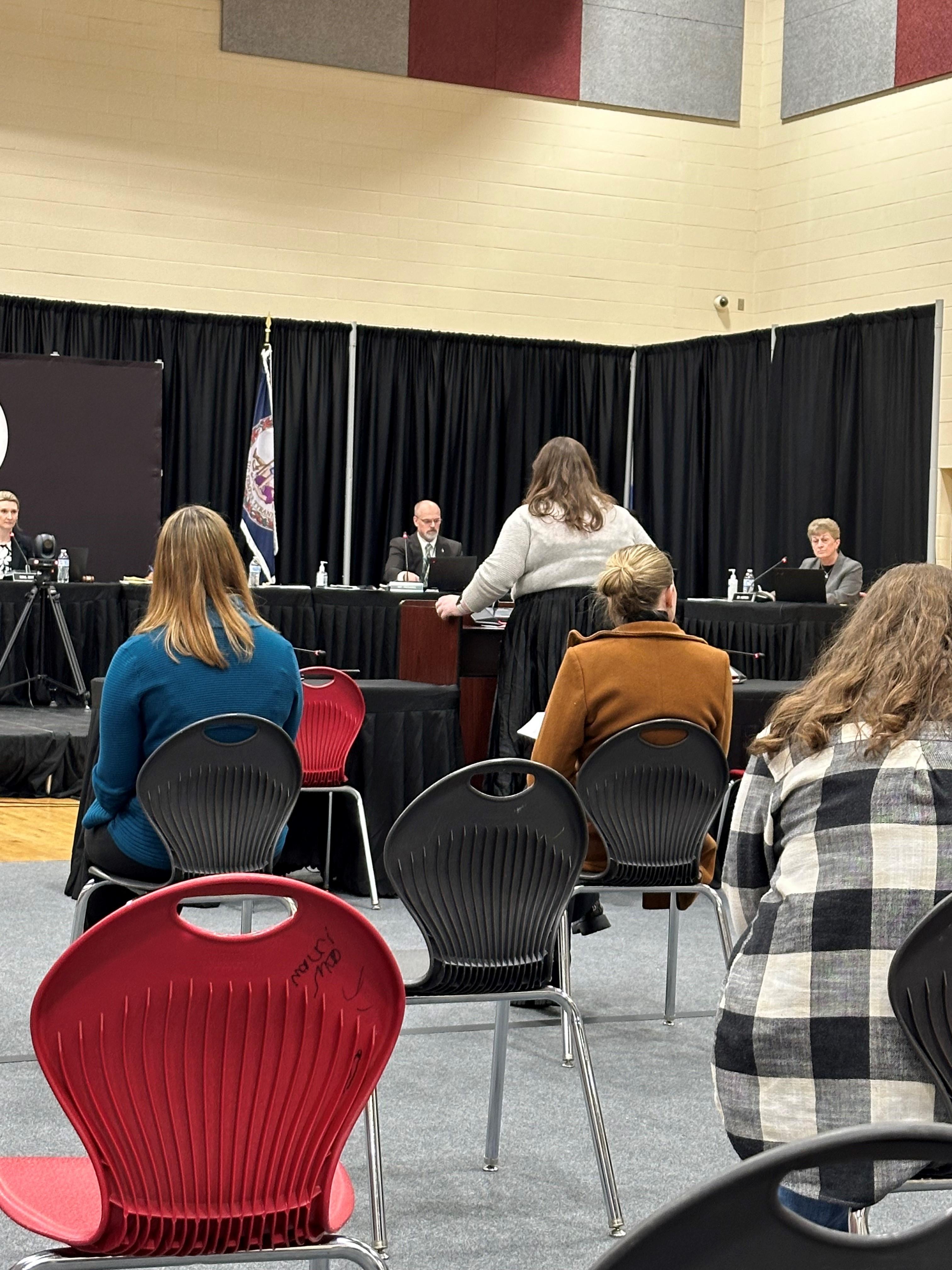

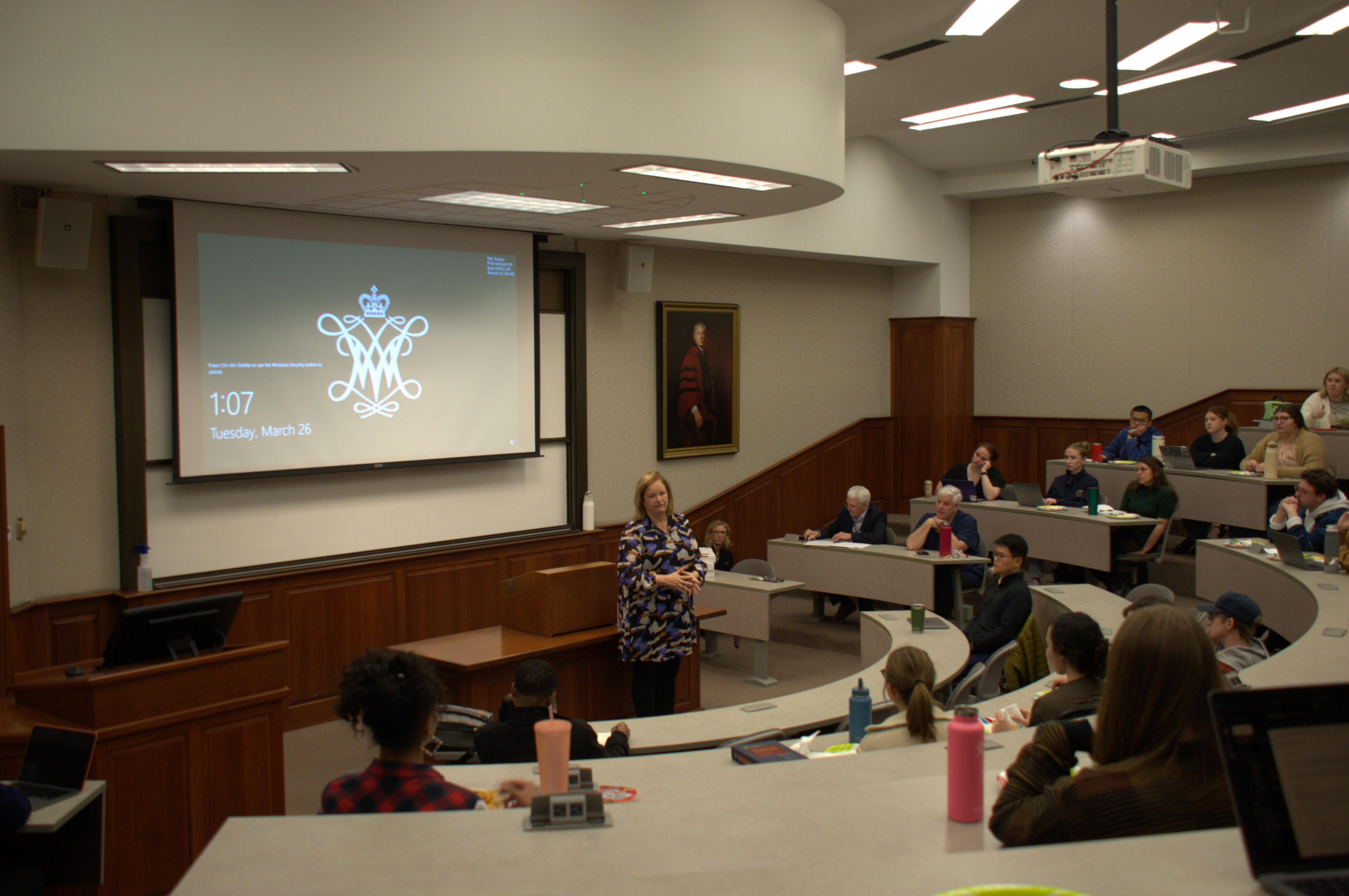


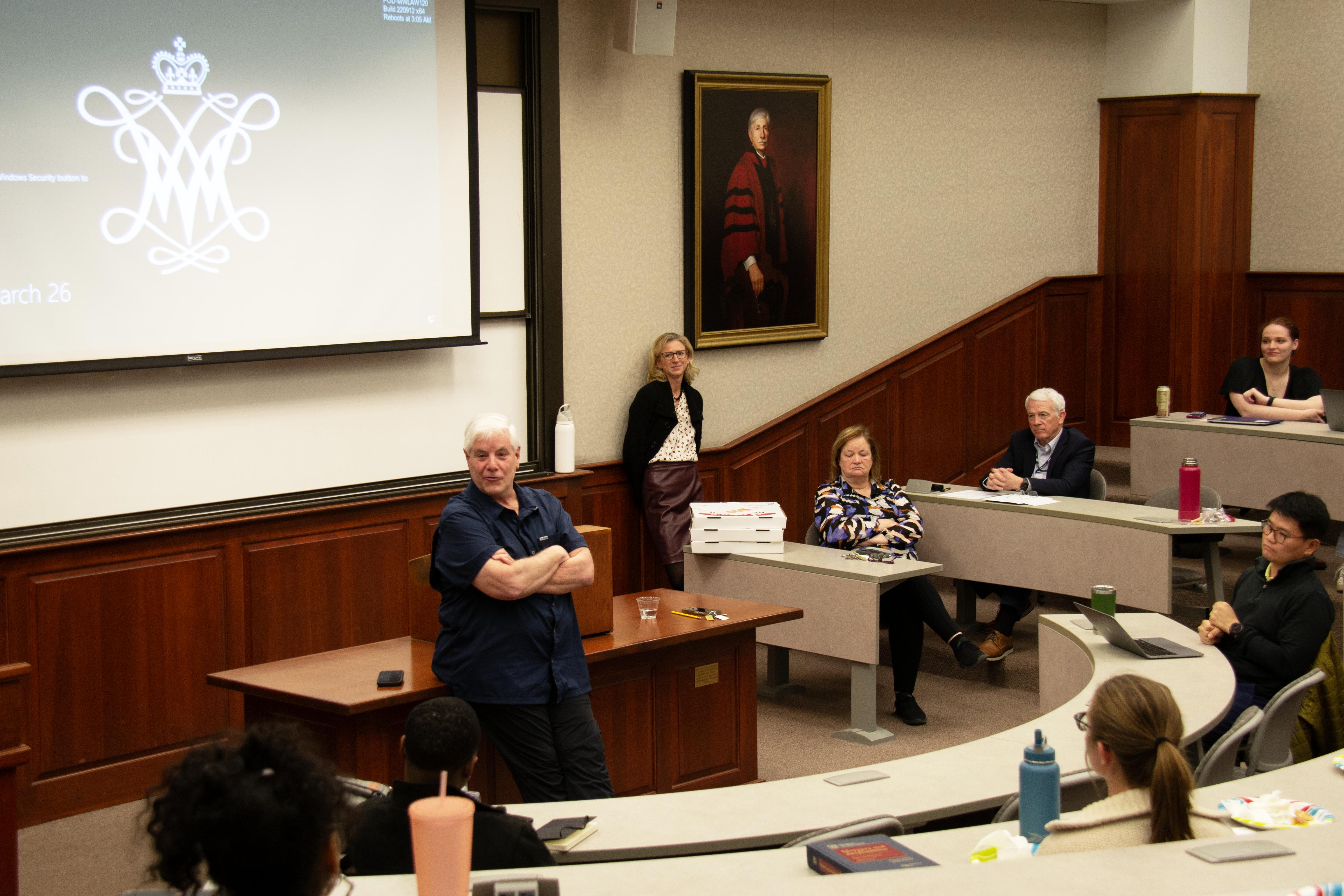


Michael Dick ’06, Colonel, U.S. Marine Corps (Ret.) has been named Director of the Lewis B. Puller, Jr. Veterans Benefits Clinic and Clinical Associate Professor of Law beginning in the 2024-25 academic year. Dick has been serving the Law School as Visiting Professor of the Practice, Co-Director of the Puller Clinic, Director of Military and Veteran Affairs, and Assistant Director, Center for International Law and Policy.
“Always mission driven, Mike Dick has been doing exceptional work with our Veterans Benefits Clinic and Office of Military & Veteran Affairs,” said William & & Mary Law School Dean A. Benjamin Spencer. "By agreeing to undertake this latest tour of duty, he will continue to be a significant force for good in supporting our military and veteran students, educating our students with real-world experiences, and helping veterans get the benefits that drastically improve their quality of life.”
“I am honored to have this opportunity to serve the Law School,” Dick said. “The Puller Clinic is a national leader in the clinical education of future lawyers, and I am humbled to follow in the footsteps of folks like Patty Roberts and Stacey-Rae Simcox who built the foundation on which the Clinic stands.”

Clinical Program Director and Immigration Clinic Director Stacy Kern-Scheerer was recognized during William & Mary's Opening Convocation ceremony for her service efforts in the community. At the event held in the Wren Yard, W&M President Katherine A. Rowe presented Clinical Associate Professor of Law Stacy Kern-Scheerer The 2023 President’s Award for Service.
Given annually to one student and one faculty or staff member, the award honors people “who have demonstrated a sustained commitment to service and made a significant and measurable impact on our community.”
Professor Kern-Scheerer has long been interested in supporting the immigrant community and founded the Immigration Clinic at W&M Law School in 2019. The Clinic’ s goals include providing pro bono, trauma-informed representation to immigrants in Hampton Roads and training law students to
provide that representation while they build their own skills as immigration advocates.



Since the Clinic launched, it has provided more than $4 million in pro bono legal representation, which has resulted in securing asylum and green cards for clients who may not have access to representation otherwise. While more and more law students enroll in the Clinic each year, the demand is outpacing their capacity – illustrating the pressing need for such services. *
*Click here to read Erin Jay'sarticle in its entirety.

Congratulationsto KaitlynFrerking,'24, thisyear'srecipientofthe SpecialEducationAdvocacy Award
Congratulationsto JosieMcGuire,'24, thisyear'srecipientofthe PullerClinic'sBozmanAward

Congratulationsto MunseongPark,'24, thisyear'srecipientofthe ClinicalLegalEducation AssociationAward

CongratulationstoClinicalProgram studentemployeeBrittanyBonin. graduation,Brittanywillserve asa ClerkintheNewJerseySuperiorCourt.

BettawasabelovedmemberoftheWilliam&Mary LawSchoolFamily for35years.InkeepingwithherloveofhelpingothersBettahelda specialplaceinherheart fortheClinicalProgram,evengoingasfarto learnphrasesinotherlanguagestowelcomeourclientsandpotential clientsastheyenteredthelawschool.
Wewillallmissher.

